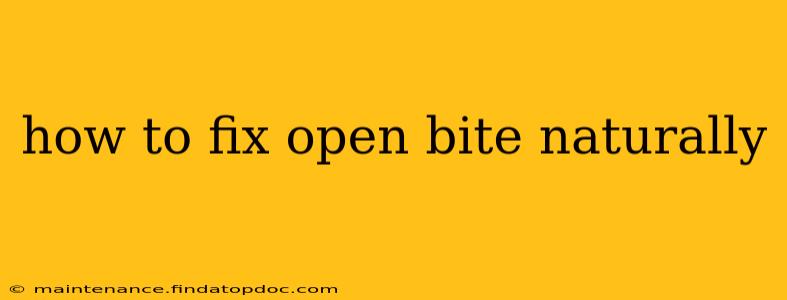An open bite, characterized by a noticeable gap between your upper and lower front teeth when your jaws are closed, can impact your bite, speech, and even your self-esteem. While traditional orthodontic treatments like braces are common solutions, many individuals seek natural ways to address this condition. This article explores various holistic approaches to improve open bites, emphasizing that these methods may not be suitable for all cases and should be considered alongside professional dental advice. It's crucial to consult your dentist or orthodontist before embarking on any treatment plan.
What Causes an Open Bite?
Understanding the root causes of an open bite is the first step towards finding a solution. Several factors can contribute to this malocclusion, including:
- Thumb sucking or other oral habits: Prolonged thumb sucking or pacifier use during childhood can significantly affect jaw development, leading to an open bite.
- Tongue thrusting: Pushing the tongue against the front teeth can also interfere with proper jaw alignment.
- Genetics: In some cases, an open bite is inherited.
- Mouth breathing: Chronic mouth breathing can alter facial growth and contribute to an open bite.
- Certain medical conditions: Some underlying medical conditions can also influence jaw development.
Can You Fix an Open Bite Naturally?
While completely correcting a severe open bite naturally might be challenging, several strategies can help improve the condition or mitigate its effects. These methods often focus on addressing the underlying causes and promoting proper jaw alignment.
1. Addressing Oral Habits: Quitting Thumb Sucking and Tongue Thrusting
H2: How can I stop tongue thrusting?
Stopping tongue thrusting involves conscious effort and often requires professional guidance. Myofunctional therapy, a specialized form of therapy, helps retrain the tongue's position during swallowing and rest. This therapy often involves exercises and techniques to strengthen the muscles surrounding the mouth and improve tongue posture. A speech therapist or myofunctional therapist can provide personalized guidance.
H2: How to break a thumb-sucking habit?
Breaking a thumb-sucking habit, especially in children, requires patience and positive reinforcement. Strategies can include:
- Positive reinforcement: Rewarding the child when they resist thumb sucking.
- Bitter-tasting nail polish: Applying a bitter-tasting substance to the thumb can deter sucking.
- Identifying triggers: Understanding what situations trigger thumb sucking helps in managing the habit.
- Professional help: A therapist or counselor might be helpful for older children or adults struggling with the habit.
2. Improving Breathing Habits: Transitioning to Nasal Breathing
H2: How can I stop mouth breathing?
Mouth breathing can worsen an open bite. Encouraging nasal breathing through exercises, addressing nasal congestion (if present), and practicing proper breathing techniques can help. Consider consulting an ENT specialist if you suspect underlying nasal issues.
3. Myofunctional Therapy: Strengthening Oral Muscles
Myofunctional therapy plays a vital role in correcting open bites by strengthening the muscles responsible for proper jaw function and tongue posture. This non-invasive approach focuses on retraining the muscles to work together harmoniously, improving overall oral health.
4. Nutritional Considerations: Supporting Jaw Development
H2: What foods help with jaw development?
While no specific foods directly "fix" an open bite, a healthy, balanced diet that supports overall growth and development is crucial. Ensuring adequate intake of calcium, vitamin D, and other essential nutrients is vital for strong bones and healthy jaw development.
5. Natural Remedies: Exploring Supporting Therapies
Some individuals explore alternative therapies like acupuncture or massage to alleviate muscle tension or promote jaw alignment. However, it's crucial to understand that these approaches are often considered complementary therapies and shouldn't replace professional dental care.
When to Seek Professional Help
It's important to remember that natural methods may not be sufficient for all cases of open bite. If the open bite is severe, significantly impacting your bite, speech, or appearance, seeking professional help is crucial. An orthodontist can provide a proper diagnosis and recommend the most appropriate treatment, which may involve traditional orthodontic methods like braces or Invisalign.
Disclaimer: This information is for educational purposes only and should not be considered medical advice. Always consult with a qualified dentist or orthodontist for diagnosis and treatment of an open bite. The effectiveness of natural methods varies greatly depending on individual circumstances and the severity of the open bite.
